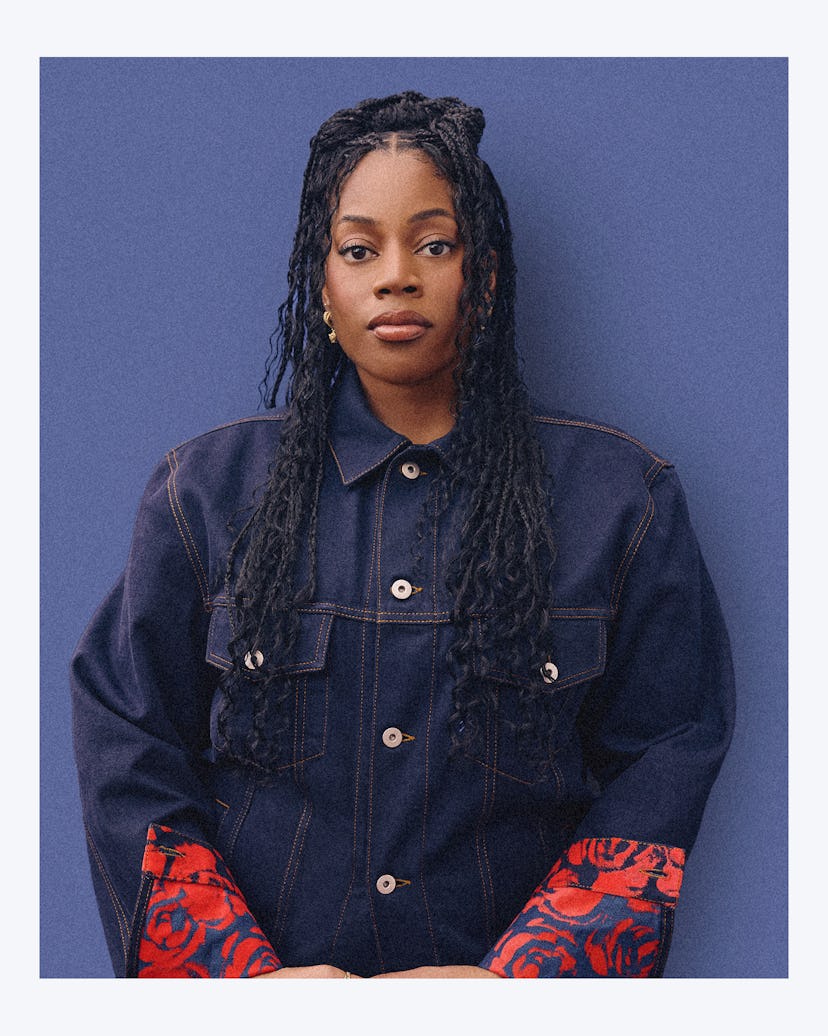Queenie Star Dionne Brown on the Upsides of Being Messy

“Your 20s are formative years. The bad choices make good stories. It’s okay to be messy,” Dionne Brown tells me during a recent interview on Zoom. The English actress is referring to the important life lesson she picked up while portraying the titular character at the heart of Queenie, Hulu’s highly anticipated eight-episode series based on Candice Carty-Williams’s popular novel of the same name.
Set in South London, the series invites viewers into the inner world of Queenie Jenkins, a 25-year-old Jamaican-British woman navigating the growing pains of her 20s—hiccups, misadventures, and all. Queenie is bubbling with emotion, yearning, and uncertainty. She’s got creative ambition, but an unfulfilling job that undervalues her; she’s seeking companionship and tenderness, but with men undeserving of her time. Plus, she’s got abandonment wounds from childhood, and struggles to set boundaries. When her personal needs are not met, she stays quiet, locking it all inside.
The chance to play such a multifaceted character and stretch her creative muscles was an exciting prospect, says Brown, recounting the feelings that arose when she first read the script for Queenie. “It just reminded me of how we are as people. We’re super complex, the simplest things are not so simple to us. We’re all emotion, let’s be honest,” she adds. “Being younger and just feeling super, super sensitive and not knowing how to process my sensitivity was a feeling that resonated with me. That’s definitely what drew me to her.”
Dionne Brown as Queenie in a still from the Hulu series.
The series is an immersive, emotional rollercoaster. Memories haunt and torment Queenie, and eventually lead to the decline of her mental health. There’s a refreshing specificity in Queenie’s experience that hones in on the common slights and indignities Black women quietly get bullied into accepting as the norm. Watching the series prompts existential questions: What does it do to your confidence when your voice and contributions are constantly dismissed? How does being hypervisible and simultaneously not seen change you? Can a romantic relationship flourish if your partner doesn’t validate your experiences navigating racism and misogynoir?
Despite these meaty themes, viewers aren’t left in a pit of despair, thanks to a heartfelt performance by Brown and the supporting cast, along with the thoughtful eye of author-slash-showrunner Carty-Williams. Queenie’s tribe collectively adds so much sweetness and levity to the series. There’s Queenie’s aunt and her grandparents, who are a soft place to land and a cherished lifeline to her Jamaican heritage; a sage younger cousin who reminds Queenie there are paths to storytelling beyond her corporate bubble; and a supportive group of friends, including bestie Kyazike (played by musician Bellah), who are intentional about reflecting Queenie’s humanity back to her during tough moments.
Dionne Brown and Bellah in a still from Queenie.
This struck a chord with Brown, who is also Jamaican-British, and who deeply values her own meaningful friendships. “Friends are chosen family,” says Brown, who considers working alongside the actors who played Queenie’s friends one of her favorite aspects of filming. “It all contributed to how she perceives herself. I’m lucky enough to be blessed with really enriching friendships personally in my life and I know a lot of people aren’t that lucky.”
Trauma and what can unfold when deep-seated wounds go unattended is a major theme in the show. But unlike her character—who is still grasping the concept of dealing with her emotional issues head-on and learning to walk away when she’s not treated well—Brown is in a vastly different place in her life. “I’m familiar with being in a kind of space where I can see that people are just not taking to my energy. I’ve always been comfortable removing myself from that space, where obviously Queenie isn’t,” Brown says, in reference to Queenie’s strained relationship with her boyfriend, Tom. “Where I would personally take a step back, she’s rooting herself there, which I think [shows her] bravery and her resilience, just in a different way. She’s doing that because she loves him and she’s choosing him…[but] she neglects herself because she overlooks the fact that he isn’t choosing her.”
The balm to this heartache is perhaps the love story that shines brightest throughout the series: Queenie’s relationship with herself. As she grows, eventually embarking on her own healing journey, viewers witness a deepened understanding that is a game-changer. The love, effort, and time Queenie has been so ready to give someone else first needs to be invested in herself. As Brown notes during our chat, self-acceptance, self-confidence, and a healthy amount of self-reliance can do wonders in a woman’s life.
“The book is so beautifully written and it encapsulates the characters’ stories so well,” the actress adds. “I just hope everybody enjoys the journey.”